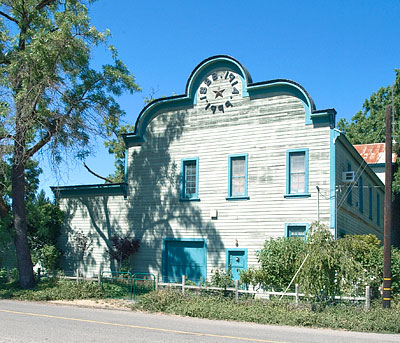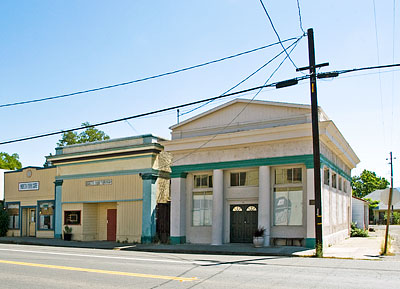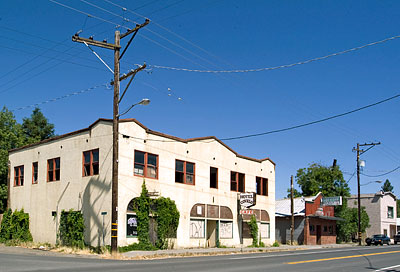National Register of Historic Places in Mendocino County
Round Valley Flour Mills
Main and Greely Streets
Covelo
Built 1880s
The Round Valley Flour Mill, which was a steel-roller grain mill powered by steam, is approximately forty feet wide and seventy feet long. Some of the machinery dates to the 1880s and was operable as recently as 1975.
The mill is important because it provided work for Indians who had been relocated to the Covelo area in the 1850s and 1860s.
After considerable suffering from lack of traditional food, the Indian families received land allotments under the Dawes Severalty Act of 1887.
In 1934, the Indian Reorganization Act repealed the Dawes Act, and no Indian was allowed to buy or sell land, hold deeds, or handle cash. Because the government policy in Round Valley between 1887 and 1934 focused on agricultural and stock development, the flour mill provided valuable work and training for Indians in the area. It also served as a outlet for the Indians' milling of crops.
The mill not only played a prominent role in the growth of local agriculture, but also helped reservation Indians acquire new skills at a time when they no longer had easy access to their traditional way of life.
Source A History of American Indians in California by the National Park Service.

The small town of Covelo lies in the mountain-rimmed bowl of Round Valley almost entirely within the boundaries of the Round Valley Indian Reservation, the largest Indian reservation in California.
While the population of Cavelo numbers fewer than 1,200, a disproportionate number of residents are artists. Talented locals specialize in media as varied as Japanese textiles, ceramics, photography, painting, sculpture, and Native American beading and basketmaking.
Source: Mendocino County website.

It is the most impoverished and isolated community in Mendocino County, with one road into town and no other way out except dirt roads through the National Forest. The nearest towns, Laytonville and Willits, are over an hour away. With 27% of Round Valley residents living below the poverty line, an estimated 90% of its 1000 households grow pot to survive.
Law enforcement conducts raids there every year, generally at harvest when they can do the most harm. It's easy for sheriff's deputies to slide in, with or without a warrant, ignore a doctor's note and seize a family's plants, children, cash, bank accounts, all the trimmers in sight, and call it a good day for police budgets.
This year's mass raids and terrorizing of the Indian Reservation and townspeople lasted three days, Sept 28-30, as separate law enforcement teams fanned out into the National Forest with sheriff's deputies, federal agents and embedded media side-by-side. National Geographic and Rolling Stone magazines were media of choice.
While police wreaked havoc on the townspeople and reservation, media focused on the noisy drama of cutting down thousands of plants from public forestland, pointing fingers at mass commercial grows and distracting from the tornado that flattened the town.
"They come every year but this time it was 100 times worse, over 50 arrests, all our medicine gone," said one witness to the attack. "The Reservation was hit hardest. The town is devastated. We are already very poor and now what little we had has been taken."
Locals describe the raid as unprecedented in scope - relentless fly-overs with four helicopters hovering low over gardens or just above tree tops to gather pre-raid information and terrorize people with a show of force from the air before their homes were invaded.
Many people expressed panic that the helicopters would land in their backyards and arrest them. Several left their homes to escape potential arrest. One couple had scratches on their arms from hiding in the blackberry bushes overnight.
Source: West Coast Leaf: The Cannabis Newspaper of Record, 8 December 2010.


